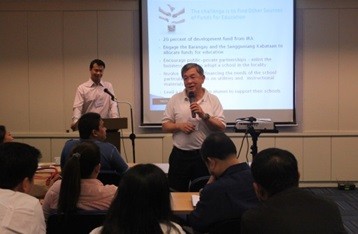
July 2014—The call for local government executives to keep a high level of integrity was never more apparent among peers than during local school board workshops conducted in the Philippines in November 2013 under a USAID project.
As part of the Education Governance Effectiveness (EdGE) project in Central Luzon, participating public officials and local government representatives constantly remind their counterparts to maintain transparency and accountability, bucking the historical norm of corruption that has soiled the country’s reputation for decades.
“We must be sincere in our projects,” Caloocan City Chief of Staff Jose Carlos III says to representatives from six cities and six municipalities. “Have eagle eyes," he adds, referring to strict monitoring of public funds.
Similarly, Valenzuela City Representative Sherwin Gatchalian stresses the importance of integrity as he discusses effective ways to collect taxes for the Special Education Fund. He points out that all efforts will be cancelled out if the integrity of the chief executive is in question.
“Your best tax collector is your own taxpayer,” says Gatchalian. He explains that people willingly pay their taxes if they have confidence in their government and will encourage others to do the same. In contrast, they will avoid paying taxes if they see that projects are slow or funds are being misallocated.
“Parents must know that the Special Education Fund comes from taxes—not from the pockets of politicians,” he says, adding that chief executives must interact with the community to prove this.
The concerted effort to involve local government is just one of the benefits that the EdGE program has delivered to help reinvent local school boards, improve education, and provide better opportunities for the country’s future generation.
The five-year EdGE project, which runs from 2013 to 2018, seeks to improve education governance through decentralization, with the end goal of improving learning outcomes, particularly early grade reading, for at least 1 million children.
LINKS
Follow @USAID_Manila, on Facebook, on Flickr, on YouTube







Comment
Make a general inquiry or suggest an improvement.